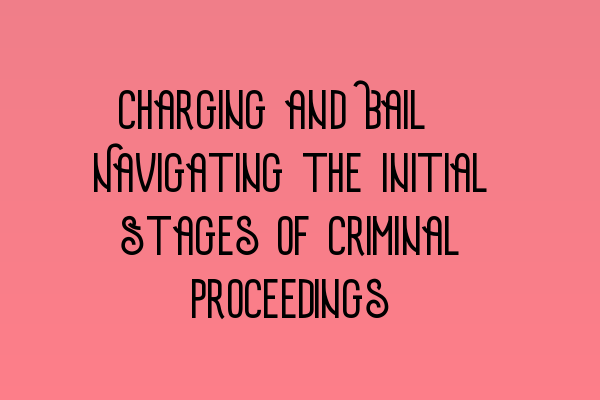Charging and Bail: Navigating the Initial Stages of Criminal Proceedings
When a person is arrested and charged with a criminal offense, it marks the beginning of a legal process that can have serious implications for their future. Understanding the initial stages of criminal proceedings, including charging and bail, is crucial for both defendants and their legal representatives.
The Charging Process
In criminal law, charging refers to the formal accusation made by a prosecuting authority against the individual suspected of committing a crime. The charging decision is based on the evidence and facts presented by the investigating authorities.
At SQE Criminal Law & Practice Law UK, we understand the importance of preparing aspiring solicitors for the charging process. Our SQE 1 Practice Exam Questions and SQE 1 Practice Mocks FLK1 FLK2 resources are designed to enhance your knowledge and skills in this area.
The charging decision is crucial because it determines the nature and severity of the offenses the defendant will face. It is the responsibility of the prosecuting authority, often the Crown Prosecution Service (CPS) in the UK, to decide whether there is sufficient evidence to support a charge.
During the charging process, it is essential to have legal representation to ensure that your rights are protected. Our experienced solicitors at SQE Criminal Law & Practice Law UK can guide you through this stage, provide expert advice, and help build a strong defense. Contact us today to learn more about our SQE 2 Preparation Courses and SQE 1 Preparation Courses.
Bail: A Precarious Freedom
After being charged, a defendant may be granted bail, allowing them to be released from custody temporarily until their trial or further court proceedings. Bail ensures that defendants are not unnecessarily detained, while also balancing the risk of them not appearing in court or committing further offenses.
Securing bail can be a complex process, involving various factors such as the seriousness of the offense, the defendant’s criminal history, and the likelihood of flight or interference with witnesses. Our solicitors have a deep understanding of the bail system and can guide you through the process.
For a comprehensive understanding of the SQE requirements and timeline, refer to the SRA SQE Exam Dates provided on our website.
Bail revocation is not uncommon if the defendant violates the conditions imposed or poses a significant risk to others’ safety. Understanding the conditions of bail and complying with them are critical to maintaining your freedom during the legal process.
At SQE Criminal Law & Practice Law UK, we aim to provide aspiring solicitors with the knowledge and skills needed to navigate the complexities of criminal proceedings. Our comprehensive training programs are designed to equip you with the necessary expertise to excel in your legal career.
Whether you need assistance with the charging process, bail applications, or any other aspect of criminal law, our team of experienced solicitors is here to help. Contact SQE Criminal Law & Practice Law UK today to get started on your journey to becoming a successful criminal law practitioner.
